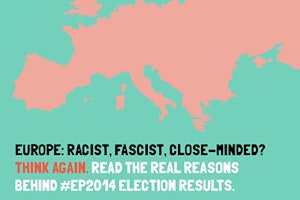Dutch Elections and the Future of Populism in the Netherlands
By Jamie Bartlett
On Wednesday, the Dutch go to the polls in an early election pundits across Europe will be watching. This week’s elections offer an opportunity to gauge the mood of a not atypical electorate amidst Europe’s continuing crisis. Never far from the headlines, far-right anti-Islam populist, Geert Wilders and his Freedom party (PVV, Partij voor de Vrijheid), will be vying to increase their support.
A new report on Wilders and the supporters of the Freedom Party, based on a survey of Wilders’ Facebook supporters, seeks to illuminate who Wilders’ social media fans are, and the relationship between social media and “real world” activism.
According to Marjolein Kampschreur, speaking at the launch of the report last week by Demos, the Open Society Foundations and De Balie in Amsterdam, social media is becoming an increasingly important part of shaping, and winning election campaigns in the Netherlands. This election is perhaps the first social media election in the country—the all-important television debates are accompanied by a “second screen” of real time social media feedback. The report on the Netherlands from the Populism in Europe series, suggests that Wilders’ supporters are—unsurprisingly—driven by concerns over immigration, Islam, and identity. But underlying these concerns is a deeper crisis of trust in the European Union (EU) and the political institutions of the country. Many turn to Wilders, not strictly because of what he says, but because he appears at least willing to say uncomfortable things.
Wilders, it is widely agreed, has suffered a dip in his popularity over the last six months. His recent criticism of Queen Beatrice was not well received, and recent PVV defectors have been willing to expose the undemocratic way the one-man party is run. Bringing down the minority government—which he did in April—will have angered some voters. It is not likely that he will form part of a coalition this time around, and most forecasters predict a loss of five to 10 seats.
That does not mean, of course, the end of Wilders’ influence. The lasting legacy could be his move, over the last six months, to an overt anti-European position. He has pledged to take the Netherlands out of the EU altogether, and excoriates what he sees as unelected Eurocrats that are costing the Dutch taxpayer billions of Euros, and undermining the sovereign power of the proudly democratic nation. The European Stability Mechanism appears to have trumped the Qu’ran as the target of Wilders’ ire, at least for now.
But Wilders is no longer a lone voice arguing that the Dutch are being hurt by the EU. He is now joined by the Socialist Party (SP), led by Emile Roemer, a Euro-sceptic left-wing party. The SP has slipped in the polls over the last week or so, but is still a far more powerful voice than it was in 2010: predicted to win around 24-27 seats. The rise of left-wing, anti-austerity, sometimes anti-EU, parties has been the real story of the last year. In France (Melenchon), Germany (the Piratenpartei) Greece (Syriza), and Italy (Beppe Grillo) these parties have gone from radical fringe to major political forces.
Having an anti-EU party from both the left and the right might be of real political significance in the Netherlands, even if neither is part of a new government. Indeed, 56 per cent of the Dutch respondents in this report feel that the EU is going in the wrong direction, and a similar proportion (54 per cent) do not trust it.
During the launch event, the three panelists predicted between 20-22 seats for the PVV. Together with the SP, that could mean around [44-49 seats/ 29-33 percent vote] to aggressively anti-EU parties, both led by charismatic leaders. That, of course, will make it harder to gain mandates—essential if the EU is maintain any sense of democratic legitimacy—for austerity and bail outs from the Dutch. Even with a weaker Wilders, the next two years could prove even bumpier than the last.
Jamie Bartlett is head of the Violence and Extremism Programme at Demos, a grantee of the Open Society Foundations.
